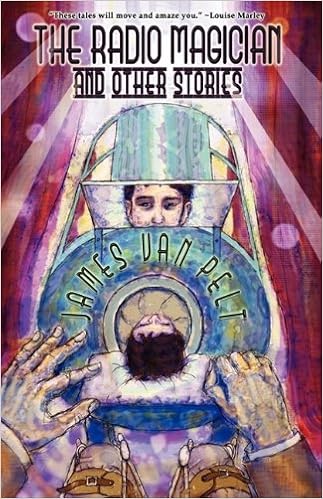I lead a prompt night for the Western Colorado Writers Forum this Thursday. It was a unique event for me on a couple levels. First, I haven’t been to any kind of public gathering since March. Non-family members in the same room with me, even masked, felt odd. Second, the presentation was a hybrid of Zoom meeting and live audience. The whole time I didn’t know if I should pay attention to the computer screen or to the people in the room.
Overall, though, it went well. They asked me for prompts bent toward science fiction, but most of them don’t write in the genre, so I felt like I was breaking in novices, even though most of them have been long-time writers.
I over-prepared, writing out the complete script of what I would say. A detailed script encourages me to read instead of teach, so I worked hard not to keep looking at this.
Here is the entire script. With 20-minute writing sessions and discussion after, this took exactly two hours:
Intro:
Zach Berkson said, “Science fiction, perhaps more than any other modern genre of fiction, is often written with a social purpose or a goal.
“Reading science fiction enables us to reflect on the ways people interact with each other, with technology, with our environment. A good science fiction work posits one vision for the future, among countless possibilities, that is built on a foundation of realism. In creating a link between the present and the future, science fiction invites us to consider the complex ways our choices and interactions contribute to generating the future.
“Why do we read science fiction? The immediate answer for some is escapism: to enter into fantastic worlds that are more exciting than mundane reality. But that’s a simplistic answer that fails to explain why we’re drawn to science fiction, which, while speculative, often nods to realism and presents a thoughtful perspective on the future – frequently one that’s informed by scientific and technological reality. The draw of science fiction is more nuanced than a desire to escape the mundane.
“Science Fiction expands the mind, considering ideas and possibilities outside our normal experience. It explores not only what is, but what might be, or could be.”
Ray Bradbury said, “”Science fiction is the fiction of ideas. Ideas excite me, and as soon as I get excited, the adrenaline gets going and the next thing I know I’m borrowing energy from the ideas themselves. Science fiction is any idea that occurs in the head and doesn’t exist yet, but soon will, and will change everything for everybody, and nothing will ever be the same again. As soon as you have an idea that changes some small part of the world you are writing science fiction. It is always the art of the possible, never the impossible.”
One way to think of what makes a science fiction different from non-science fiction is the setting. A science fiction story has something in the setting that does not exist today or in history, but is scientifically possible. The change in the setting is what the story is about, really, in the end. How does that difference in the setting reveal the human condition, or comment on today’s conditions, or warn us about the future?
A love story during a trip to Mars isn’t much of a science fiction if the trip doesn’t impact the love story in some way. If the love story is no different than the same story told on a Royal Caribbean cruise ship, for example, where every place in the story where you could have said “Jamaica” you replaced it with “Mars,” you haven’t done much with the setting. Putting a ray gun into the holster and making no other changes doesn’t turn a Western into a Science Fiction.
So one technique to create a science fiction story is to incorporate the change or changes in the setting that make it a science fiction, and then write your path into it.
Dialogue Prompt:
One strategy is to just have a pair of characters talking. This is a dialogue prompt. Dialogues that are good reading often have a tension in them, otherwise they’re just two people who aren’t really talking or who are just agreeing with each other. To make the dialogue pop, start with some kind of tension. Maybe the two characters are fighting. They have a disagreement that displays itself in the dialogue. Maybe one character is trying to convince another character of something. Maybe one character knows something that they want the other character to understand. Maybe the two characters are talking about a subject that is so sensitive to them that neither one is willing to name the real subject of the discussion. Maybe one character is trying to sell something to the other, or convince them to change a political position. Maybe the discussion is a disagreement in parenting styles.
Whatever. For this prompt, write a dialogue between two characters that takes place in a science fictional setting. Their discussion needs to either be about the science fictional element, or be impacted by the science fictional element. In other words, this dialogue could not exist without the science fiction in it. You can show the science fiction within the quotes, or in your description of the characters’ thoughts and actions outside of the quotes. Don’t agonize over anything! Close your eyes. Let them talk. Don’t worry about where the discussion will end up. You have fifteen minutes.
Go.
Setting Prompt:
Setting, of course, is where your story takes place, and we’ve already said that what makes science fiction what it is is setting, so clearly you’ll need to give it some thought. Also, there’s a convincing argument that one reason we read is to be taken out of our reality and into another. Most writers know this, so they spend considerable amount of time describing setting, some of them to the detriment of story. Just like when we wrote dialogue with tension, setting should be a part of the action in the story. Description of setting should be tied to what your characters are doing. People hardly ever just stop and inventory the world around them, and reading about people who do that can create a boring story (unless you are just brilliant in writing descriptions that are worthy all by themselves—Tolkien seemed to be able to do it).
For this prompt, give your character, maybe you could use one from the dialogue you’ve already written, something to do. Maybe your character is doing their job. Maybe they are trying to hide. Maybe they are looking for something. Maybe they are discovering a place that is new to them. Maybe they have a plan to change the setting they are in, drastically, and they are thinking of the contrast.
Remember two constraints:
- This is a science fiction setting. Make sure you included details that make it one.
- The setting shouldn’t be static. Your description should include your character’s actions and reactions. The story shouldn’t stop because you are describing. You can include dialogue.
Set yourself some goals while writing this:
- Use at least three of your senses more than once (sight, sound, touch, taste, smell)
- Include some ferociously specific details. It shouldn’t just be the forest; it should also be a single leaf, brown and dying, stuck to the porch rail from the last rain.
- Make sure the reader knows through the description what mood your character is in. Do they like being there? Are they afraid? Are they mad? Are they tense? Don’t forget emotion.
Go.
Character Prompt:
For the third prompt we will focus on character. Character comes out in a variety of ways. Here are the nine most common:
- Appearance
- Mannerisms
- Actions
- Speech
- Thought
- Contemplation of their past
- How they control their own environment
- How others react
- What the narrator tells the reader directly (avoid using this one unsupported from the others)
My guess is that if you used the same character in the dialogue and setting prompts that you already have done some work toward creating a character. Write a scene with that character or start a new one, where your character has a moral quandary. This is a situation where the character has to take an action that no one else will see or know about. How the scene plays out will reveal to the reader a world about your character.
A good situation might be to make a science fictional version of an old favorite: your character is walking down the street alone. On the sidewalk in front of them is a wallet. What does your character do? Write the scene. Use all of your writerly tricks. This is an introductory scene. Your narrator can describe the character if you want to (self-descriptions are tough in first person!). Use at least five of the techniques listed above to write the scene.
Go
![]() , I have enjoyed our continued correspondence.
, I have enjoyed our continued correspondence.






 You know how sports fans will sit around the table and argue about today’s teams vs. the teams of the past? How would the 1985 Chicago Bears who went 15-1 do against the Superbowl champion 2015 New England Patriots, for example? This is an evergreen topic, and I think it’s an interesting one for the modern science fiction/fantasy writer.
You know how sports fans will sit around the table and argue about today’s teams vs. the teams of the past? How would the 1985 Chicago Bears who went 15-1 do against the Superbowl champion 2015 New England Patriots, for example? This is an evergreen topic, and I think it’s an interesting one for the modern science fiction/fantasy writer.